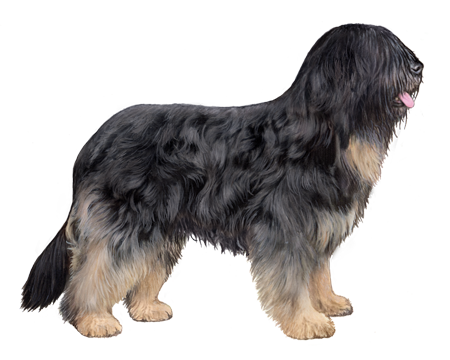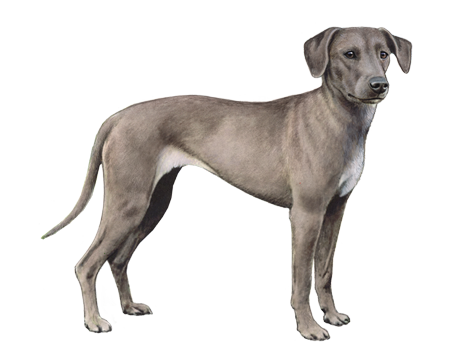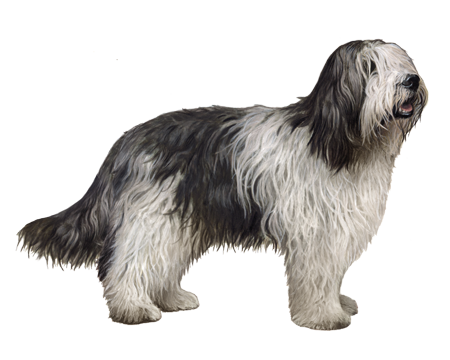
Portuguese Sheepdog
Portuguese Sheepdogs are intelligent, devoted working dogs. Best known for their dedication to their flocks and owners, Portuguese Sheepdogs are excellent watchdogs in addition to offering affection and companionship.
Interested in discovering if your dog is a Portuguese Sheepdog?
Check out Wisdom Panel's DNA tests.

Portuguese Sheepdog Traits
General Appearance
Portuguese Sheepdogs are medium-sized, agile, swift dogs that move with a light and suspended trot—or an energetic gallop when their work requires it.
Coat and Coloring
Portuguese Sheepdogs have long, straight or slightly wavy hair with a somewhat harsh texture. Some describe their hair as “goat-like.” Their hair is dense and evenly distributed but longer on their bodies and limbs. On their faces, the long hair forms a long beard, mustache, and eyebrows (but never covers the eyes).
Portuguese Sheepdogs come in six colors: yellow, brown, grey, fawn, and wolf-grey, and black.
Distinctive Physical Traits
Portuguese Sheepdogs have long, muscular backs, prominent fore-chests, and short loins. They have high-set, pointed tails that taper from the base, furnished with long, abundant hair.
The breed has short muzzles, high-set, triangular, hanging ears, and medium-sized, round eyes with lively, intelligent expressions.
Portuguese Sheepdog Temperament
Portuguese Sheepdogs are devoted to their owners and their herd, including children. They are smart, vigilant, and wary of strangers—qualities that make Portuguese Sheepdogs excellent watchdogs.
These dogs are known to bark at strange noises or unfamiliar people, which can be challenging in an apartment. Portuguese Sheepdogs require a lot of exercise and are best for active families.

Portuguese Sheepdog History
The Portuguese Sheepdog, also known as Cão da Serra de Aires, originated in Portugal and likely descended from Briards crossbred with Catalan Sheepdogs or other local mountain dogs. These dogs historically herded cattle, sheep, goats, and pigs in extreme temperatures and across rugged terrain.
The Portuguese Kennel Club granted the breed full recognition in 1932, but the status didn't save the breed from peril. The number of Portuguese Sheepdogs dwindled due to urbanization, the introduction of modern farming technologies, and lack of international breed recognition. The breed was even on the verge of extinction in the 1970s.
Determined to save Portuguese Sheepdogs, breeders emphasized their value as companions. Soon, the breed went from being the preferred by shepherds to a popular breed of family dog in Portugal.
Portuguese Sheepdog Care
Nutrition
Feed Portuguese Sheepdogs a high-quality dog food that is appropriate for their life stage (puppy, adult, senior). Portion out their food with a measuring cup and limit treats to no more than 10 percent of their daily calories to prevent overfeeding.
Grooming
The single-coated breed needs brushing at least once per week to remove dead hair and prevent mats and tangles. An occasional bath will also help Portuguese Sheepdogs look (and smell) their best.
Portuguese Sheepdogs also require regular ear cleanings, nail trims, and a dental care routine that includes at-home teeth brushing and professional cleanings. Start these grooming essentials when Portuguese Sheepdogs are puppies to ensure they are part of their routine.
Exercise
Portuguese Sheepdogs are a moderately active breed. Regular walks, trips to the dog park, or games in the backyard will help keep them healthy and happy.
Prioritize activities that provide mental and physical stimulation such as hide-and-seek, fetch, or puzzle toys to help Portuguese Sheepdogs burn off some energy.
Training
These intelligent dogs will take quickly to training. Keep Portuguese Sheepdogs engaged with a consistent (but varied) training routine that incorporates positive reinforcement and rewards.
Socialization is important, too. Introduce Portuguese Sheepdogs to new people, pets, and places from a young age to help them become well-mannered, well-adjusted dogs.
Breed Group
Herding
The herding group is a diverse category. These highly intelligent breeds were developed to guard and control the movement of livestock.
Resources
https://www.akc.org/dog-breeds/portuguese-sheepdog/
http://www.fci.be/Nomenclature/Standards/093g01-en.pdf
Reviewed July 26, 2020 by Cindy Elston, DVM, MPH


































































